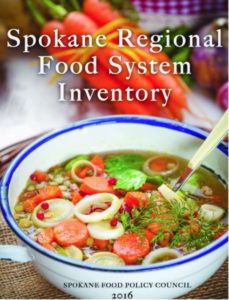On November 21, 2018, the Spokane Food Policy Council sent a comment to the Congressional Conference Committee leadership to let them know what kind of Farm Bill the Council would like to see come out of the reconciliation process. Here is the text of the comment:
To: The Honorable Pat Roberts Chairman
Senate Agriculture Committee
109 Hart Senate Office Building
Washington, DC 20510-1605
Fax: 202-224-3514
The Honorable Debbie Stabenow
Ranking Member, Senate Agriculture Committee
731 Hart Senate Office Building
Washington, D.C. 20510-2204
Fax: 202-228-0325
The Honorable Mike Conaway Chairman
House Agriculture Committee
2430 Rayburn House Office Building
Washington, DC 20515
Fax: 202-225-1783
The Honorable Collin Peterson Ranking Member
House Agriculture Committee
2204 Rayburn House Office Building
Washington, DC 20515
Fax: 202-225-1593
November 21, 2018
Dear Members of Congress,
The Spokane Food Policy Council’s mission is “to advance policies and initiatives that foster a resilient food system in the Spokane area; one that is healthy and equitable for its citizens, economy and environment.”
The Spokane Food Policy Council recognizes that the US House and US Senate each passed their versions of the Farm Bill back in June and you are now in conference committee discussions to reconcile the differences between the House and Senate versions. We are writing to urge your support for and your opposition to certain provisions that are of great concern to our Council, as follows.
We support:
• Increasing funding for SNAP employment and training programs. These programs help move people off SNAP and into good paying jobs;
• Reauthorization of the Food Insecurity Nutrition Incentive (FINI) grant program and provisions that reduce barriers for seniors to participate in the Commodity Supplemental Foods Program (CSFP);
• On-going organic certification cost-share assistance for farmers and handlers in all states;
• Permanent mandatory funding for the Organic Agriculture Research and Extension Initiative (OREI) to $40 million annually for fiscal year 2019 and 2020, $45 million for fiscal year 2021, and $50 million for fiscal year 2022 and beyond, thus achieving permanent baseline funding status;
• Increased authorities, responsibilities and resources for the National Organic Program to implement organic import enforcement, including provisions to improve tracking of organic imports and ensure that imported products fully comply with U.S. organic standards;
• A state organic allocation for the Environmental Quality Incentive Program (EQIP) to increase the payment limit for the Organic Initiative to $160,000 for the period of fiscal years 2019 through 2023;
• Making it easier for landowners with Conservation Reserve Program (CRP) contracts to start the 3-year organic transition process prior to the expiration of their CRP;
• Retention of the Senate CSP provisions within Section 2204 of the bill to require an allocation of funds to each state to support organic production and transition to organic;
• Efforts to address some of the risk management challenges and inequities facing organic farmers;
• A national strategic germplasm and cultivar collection assessment and utilization to preserve the viability of, and public access to, germplasm and cultivars including $50 million annually for public cultivar and breed development activities and to establish a Coordinator position within the National Institute for Food and Agriculture (NIFA);
• The Local Agriculture Marketing Program and the Farming Opportunities Training and Outreach Program.
We oppose:
• The plan in the House version of the Farm Bill to take food off the tables of over 2 million struggling Americans by cutting SNAP by nearly $19 billion and the work requirement proposals for SNAP recipients contained in the House version;
• Unnecessary statutory changes to the National Organic Standards Board structure and the process the board uses to review and approve materials for use in organic;
• The elimination the Conservation Stewardship Program (CSP);
• Stripping authority from local municipalities to put rules in place protecting their communities from health-harming pesticides.
Thank you for your consideration of these matters,
The Spokane Food Policy Council


